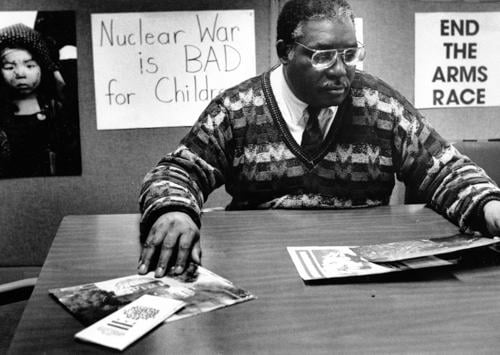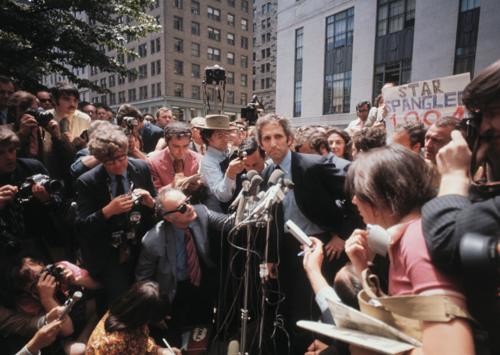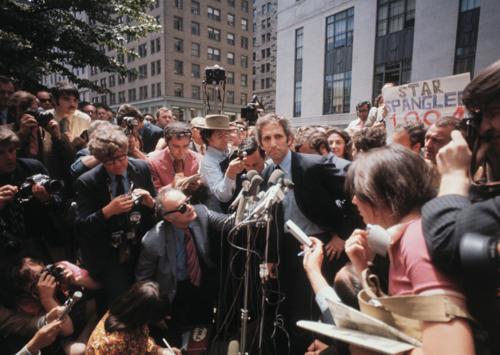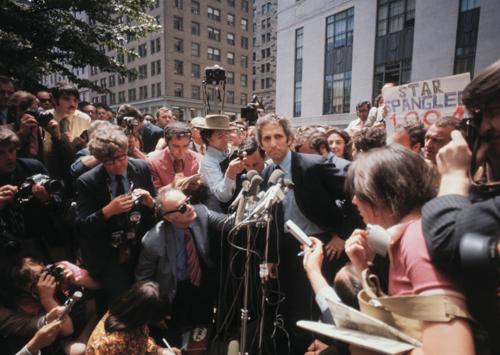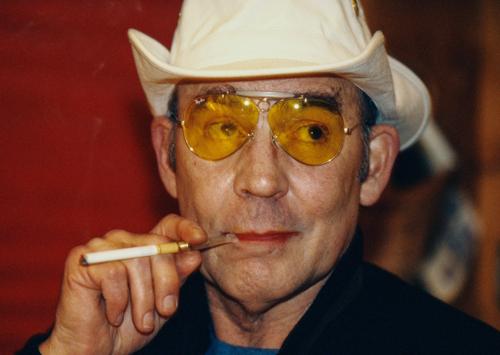Listen to New Voices on Studs Terkel our partnership with 826CHI-here! Read the Story
Showing 16 - 30 of 32 results
-
Interviewing Arnold True, United States Navy Rear Admiral, about his anti-war political activity
Jan. 20, 1977 Program includes songs about the Vietnamese Conflict.
-
Interview with three members of the International Alliance of Atomic Veterans
May. 17, 1984 Interviewing an American, Australian and Scottish member of the International Alliance of Atomic Veterans. The International Alliance of Atomic Veterans is a veterans' group committed to the abolishing of all nuclear weapons.
-
Interview with Dr. Charles Clements and Asa Baber
May. 20, 1986 Interviewing Vietnam veterans and peace activists Dr. Charles Clements and Asa Baber.
-
Garry Wills discusses his book "John Wayne's America: The Politics of Celebrity"
Mar. 10, 1997 Garry Wills, writer and historian, discusses his book "John Wayne's America: The Politics of Celebrity." He explores the popularity of John Wayne that took him from an actor and made him into an American symbol. He explores how the symbol of John Wayne is used by white male politicians to influence their decisions and how that affected the Vietnam War. Wills gives a biography of John Wayne, including the many influential people in his life such as his working partner, John Ford.
-
Garry Wills discusses his book "John Wayne's America: The Politics of Celebrity"
Mar. 10, 1997 Garry Wills, writer and historian, discusses his book "John Wayne's America: The Politics of Celebrity." He explores the popularity of John Wayne that took him from an actor and made him into an American symbol. He explores how the symbol of John Wayne is used by white male politicians to influence their decisions and how that affected the Vietnam War. Wills gives a biography of John Wayne, including the many influential people in his life such as his working partner, John Ford. The song "I Ride an Old Paint" is played at the. start and end of the interview.
-
Eqbal Ahmad, Daniel Ellsberg, Anthony Lukas and Anthony Russo talk with Studs Terkel ; part 3
Jun. 9, 1972 Eqbal Ahmad, Daniel Ellsberg, Anthony Lukas and Anthony Russo discuss Anthony Russo's trial and treatment he endured during his time from conviction to release in federal prison compared to the treatment of prisoners tortured in Vietnam.
-
Eqbal Ahmad, Daniel Ellsberg, Anthony Lukas and Anthony Russo talk with Studs Terkel ; part 2
Jun. 9, 1972 Daniel Ellsburg, Eqbal Ahmad, Anthony Lukas, and Anthony Russo discuss Anthony Russo's time in jail, the leak of the Pentagon Papers, Vietnam War, torture of Vietnam prisoners being ignored, corruption in politics, and working for Rand.
-
Eqbal Ahmad, Daniel Ellsberg, Anthony Lukas and Anthony Russo talk with Studs Terkel ; part 1
Jun. 9, 1972 Eqbal Ahmad, Daniel Ellsberg, Anthony Lukas and Anthony Russo discuss their introduction into becoming activitsts, leaking the Pentagon Papers, Nixon Administration, and their philosophy on working for men in power.
-
Donald Duncan reads from and discusses his book "The New Legions" ; part 2
Content Warning: This conversation includes racially and/or culturally derogatory language and/or negative depictions of Black and Indigenous people of color, women, and LGBTQI+ individuals. Rather than remove this content, we present it in the context of twentieth-century social history to acknowledge and learn from its impact and to inspire awareness and discussion. While reading a passage from his book, Donald Duncan questions why he and other military personnel are in Vietnam. He finds other men that feel the same way, too,
-
Donald Duncan reads a poem written by a Vietnamese man ; part 3
Donald Duncan shares a letter that was written in response to American aid to the Vietnamese people. In conclusion, Duncan offers his reflections about why he was against the Vietnam War.
-
Donald Duncan discusses his book "The New Legions" ; part 1
"The New Legions," is partly an autobiography of Donald Duncan's time spent in the military, in the special forces in Vietnam. Duncan, a former master sergeant, explains how the military teaches its men how to kill. He further explains how the sole purpose of special forces is to go into a country and organize its people against unpopular governments.
-
Discussing the book, "Fear and Loathing: On the Campaign Trail '72." with Hunter S. Thompson
Mar. 14, 1973 Discussing the book, "Fear and Loathing: On the Campaign Trail '72." Includes a clip of Ron Kovic speaking at the Nixon campaign headquarters, courtesy of KPFA/Pacifica Archives.
-
Daniel Ellsberg Discusses the publication of "The Pentagon Papers" ; part 1
1980 Daniel Ellsberg, political activist and former military analyst, discuses his release of the Pentagon Papers and his thoughts on how the Vietnam War played out. He also discusses what he believes the next war could look like and how America, and the world, would be affected by nuclear war.
-
Daniel Ellsberg discusses nuclear warfare and its worldwide impact
Feb. 14, 1994 Interviewing former government official, Vietnam War opponent, and political activist Daniel Ellsberg. Program includes an excerpt of a 1980 interview with Ellsberg. Includes a test tone lasting about 20 seconds. Content Warning: This conversation has the presence of outdated, biased, offensive language. Rather than remove this content, we present it in the context of twentieth-century social history to acknowledge and learn from its impact and to inspire awareness and discussion.



